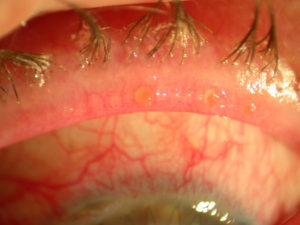Blepharitis
Blepharitis is chronic inflammation (not necessarily infection) affecting the eyelids.
Anybody can get this but some people are genetically predisposed. It causes the eyes to be red, gritty, dry, irritable, or generally uncomfortable. The condition tends to block up the glands in the eyelids (meibomian glands) that make the lubricating oils that should be in the tears to keep the eyes clear and comfortable. Inflammatory chemicals from the eyelids get into the tears and can aggravate the surface of the eye, causing variable irritation, redness, watering and variability of vision.

What can you do about this?
Unfortunately, blepharitis cannot be completely cured and the structural changes in the eyelids cannot be reversed, but the symptoms can be controlled. The aim of treatment it to keep the eyes as comfortable as possible most of the time. You may be asked to do a combination of the following things:
Hot compresses and eyelid massage:
Get a small, thin, clean washcloth or flannel and roll it up into a flat log shape. Soak it under a hot tap (as warm as you can tolerate) and then squeeze it out. Hold it against your closed eyelids, making sure that you push it into the corners. Massage the eyelids gently through the cloth using your fingers until it cools down. Reheat the cloth in the water and reapply it to the eyelids. Do this for several minutes. You can try heating it in a microwave but be careful not to make it too hot. For more prolonged effect use a small wheat bag or hot pack (see www.thermaleyes.com.au)
Repeat this 2 or 3 times a day to start with and then cut it down to just at night-time. You may need to make this a permanent part of your routine to keep the blepharitis under control. You can also do this in the shower by massaging the eyelids gently while letting the warm water run on your face.
The idea of this treatment is to warm up the secretions of the glands in the eyelids so that they can run out into the tears like they should every time you blink. This helps to prevent the glands clogging up and becoming inflamed.
Cleaning of the eyelid margins is required when there is debris around the bases of the eyelashes. This debris may be skin material like dandruff, hardened oil secretions or, most commonly, from make-up. Use Sterilid, or a similar product, to clean the eyelid margins daily initially. In the longer run you may only need to do this once or twice a week to keep it under control. Make-up should be removed completely each night. As well as blocking the oil gland openings the particulate material from cosmetics gets into the eye and contaminates the tear film (even if it is labelled as hypoallergenic). Think of this as the eye equivalent of flossing your teeth.
Steroid (anti-inflammatory) or antibiotic ointment may be used. If you have been prescribed ointment to use, put a small bit of it onto your clean fingertip and rub it gently in around the eyelashes and the edge of your eyelids after doing the warm compress treatment or the eyelid cleaning. Some of it will get into the eye and this is alright as the ointment is made for this.
Sometimes doxycycline, minocycline or azithromycin tablets are used to treat blepharitis. These have a beneficial effect on the meibomian glands in the eyelids and reduce inflammation. These need to be taken for several months for a long-lasting effect. Some people need to take them indefinitely.
Taking flax seed oil or fish oil (or Lacritec) as a dietary supplement may also help in the longer run with blepharitis. These supply omega-3 and essential fatty acids that you body cannot make by itself. This helps to reduce inflammation and improve meibomian gland function. Take at least 3,000mg daily of a combination of fish oil and flaxseed oil.
Tears Again/Optrex Actimist/Murine Eye Mist sprays can help to stabilise the tear film on the surface of the eye by mimicking the function of the meibomian gland oils. This is available over-the-counter and is sprayed onto the closed eyelids 2 or 3 times daily.
Remember: It may take weeks to months for your symptoms to improve. If you stop the treatment completely your symptoms will probably come back.

